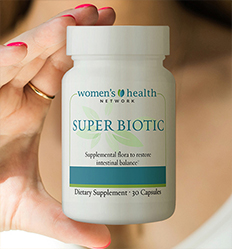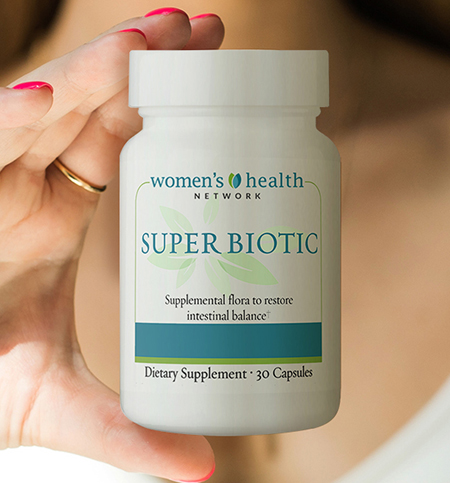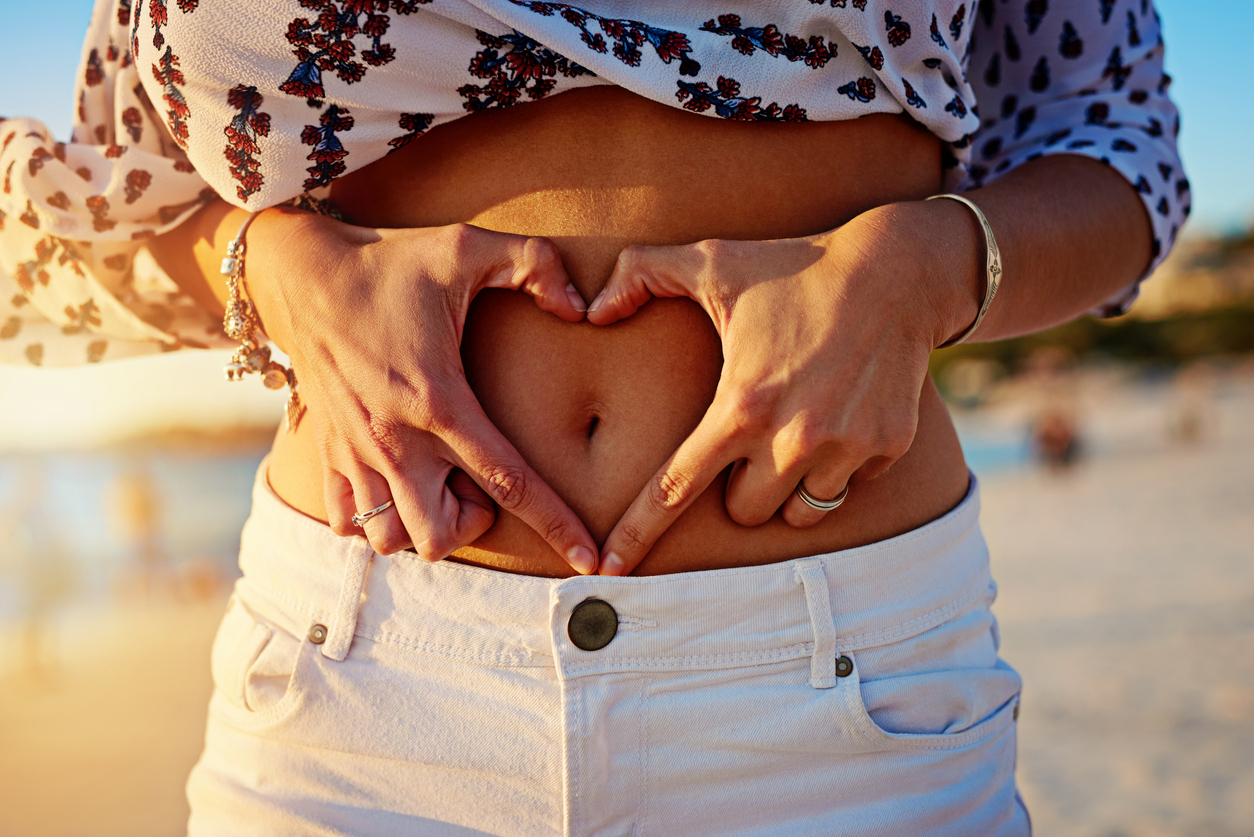The jeans that fit you yesterday are suddenly tight and uncomfortable today. Could you really have put on weight overnight? You know the answer. You’re bloated again. For many women, bloating is unfortunately a part of daily life, along with constipation, indigestion and irritable bowel syndrome. You may notice it right after a meal or within a couple of hours of eating, even when your portions were small. But you don’t have to give away all your form-fitting clothes. You can beat bloating and gas once you understand the underlying cause. And fortunately, you can make that happen more easily than you might think.
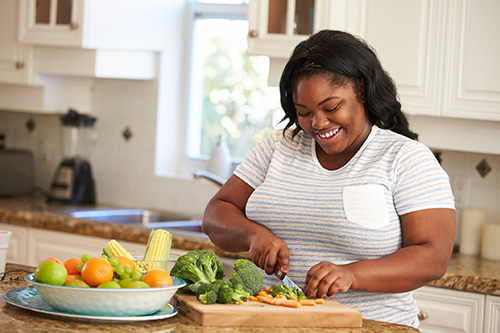
Why women are prone to bloating
Hormonal shifts during PMS, perimenopause, menopause and pregnancy can contribute to bloating in women. These hormonal changes cause your body to retain more water, decrease bile production and, often, delay elimination. Plus, hormonal effects can slow down the movement of food through the digestive system, causing women to have more constipation than men. That allows food to ferment in the gut, which produces extra gas. Your belly gets tight and puffy. And you feel more — and then even more — uncomfortable.
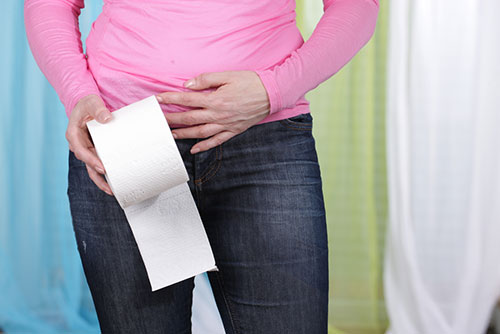
Hormonal shifts can also affect your food choices. Almost every woman knows the feeling of PMS chocolate or ice cream cravings. But unhealthy bacteria and yeast feed on sugar and carbohydrates, worsening bloating and gas. Once beneficial bacterial balance is disrupted, it will often continue until the conditions change in your belly.
Beat bloating with 3 simple steps
Step 1: Eat non-bloating foods. Is your bloating an everyday problem? The more careful you are with food choices, the more comfortable you’ll feel.
- Start by limiting processed white breads, pastas and baked goods. Skip sugary alcohol and yeasty beer until you feel better.
- Add more vegetables, leafy greens and nuts. Pay attention to whether you tolerate cooked veggies better than raw veggies. Enjoy fresh fruit, a few whole grains, beans and other kinds of fiber. Fiber is the favorite food of good gut bacteria — and when you feed the good bacteria, the bad bacteria go down in number.
- Try fermented foods. Good choices are kim chi, yogurt with live active cultures, kefir and sauerkraut. These foods naturally contain good bacteria, so can boost their concentration in your gut. The good bugs can help to crowd out the bugs causing problems and provide more digestive enzymes.
Step 2: Add bloat-busting supplements. Next, give your gut bacteria a jump start every day with probiotics. If your symptoms persist, add other supplements to help eliminate bloating and other digestive symptoms.
- Probiotics. A high-quality probiotic with several diverse strains crowds out the bad bacteria causing your symptoms. It calms bloating, gas, indigestion and nausea. At the same time it re-establishes and builds healthy colonies of beneficial gut flora.
- Prebiotics. Because prebiotics are favorite foods of friendly bacteria, they help set the stage for probiotics to flourish. You’ll find them in many non-bloating foods, like greens and grains. They’re also in onions, garlic and soy. Prebiotic supplements are available too. Keep in mind that it can take several days for your body to adjust to them, and may initially increase bloating. If they continue to do this, stop them for a while.
- Digestive enzymes. Digestive enzymes help your body break down food. These may include the standard enzymes made by your pancreas, or specific enzymes that target problem foods in some women, such as lactase or alpha-galactosidase. These can be a helpful add-on to probiotics.
Extra tip: Chew on peppermint in addition to the regimen above. Like other “carminative” herbs, peppermint can help decrease gas and bloating.
Step 3: Pay attention to constipation. Constipation is a frequent companion to bloating, especially in women. Some women only move their bowels a few times a week or less. But when it comes to bowel movements, more is better.
- Flush your body with water. Drink at least half your weight in ounces of water every day. Make sure this isn’t in the form of soda! Your body needs a lot of liquid to process waste and to encourage regular bowel movements.
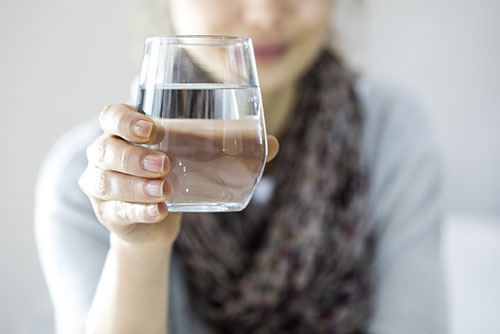
- Cut out dairy foods — at least until your bowels become more regular. Cheese, ice cream and milk can be hard to digest and are often gas-producing. And, of course, ice cream contains sugar, which is fermented within minutes by bacteria and yeast. Yogurt and kefir containing live-culture bacteria may still be okay. Swiss cheese, too. Everyone is different, so pay attention to what works and doesn’t work for you.
- Exercise in some way every day. You want to keep the digestive process in motion. Physical movement increases blood flow to your organs and digestive tract, and revs up your metabolism. It also helps push along the trapped gas that accompanies bloating.
Bloating is a symptom that can usually be relieved swiftly and effectively. But the health benefits keep unfolding from there. Like many symptoms, bloating can hint at deeper health issues. So much of our well-being is based on a well-functioning digestive system and balanced gut flora. So when you solve your bloating problem, you’re doing something very meaningful at the same time for your overall health.
 | The secret to weight loss could be hiding in your gut! See why with Probiotics for successful weight loss — the connection is real. |







